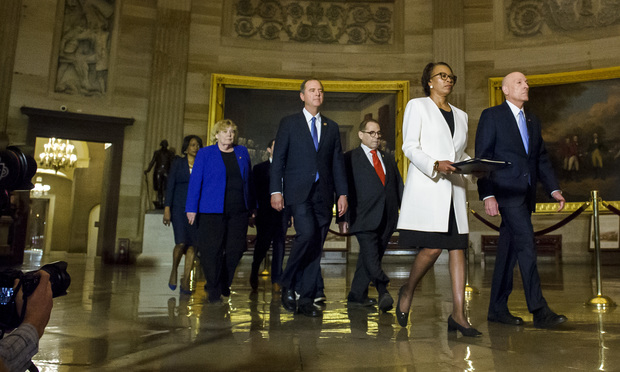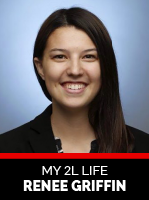For Law Students, Politics Invades the Ivory Tower
With the path from law school to political power notoriously well-paved, it's worth asking: What does law school do to a person's politics?
February 03, 2020 at 11:01 AM
6 minute read
 Clerk of the House Cheryl Johnson (second from right), flanked by House Sergeant at Arms Paul Irving (right), leads a procession of impeachment managers from the House to the Senate to deliver the articles of impeachment against President Donald Trump. (Photo: Diego Radzinschi/ALM)
Clerk of the House Cheryl Johnson (second from right), flanked by House Sergeant at Arms Paul Irving (right), leads a procession of impeachment managers from the House to the Senate to deliver the articles of impeachment against President Donald Trump. (Photo: Diego Radzinschi/ALM)
Along with ushering in a new decade and marking the halfway point for my law school career, 2020's arrival has given me a certain sense of foreboding for the political controversies it will hold.
The saga has already begun with the impeachment trial, and it promises to continue mercilessly through the November presidential election, with who knows what else in between.
 This is not a political column, and I will not be espousing my personal views at you. I hesitate to venture into this fraught area at all, but politics pervades the law school atmosphere and ignoring that fact feels unnatural to the point of irresponsibility.
This is not a political column, and I will not be espousing my personal views at you. I hesitate to venture into this fraught area at all, but politics pervades the law school atmosphere and ignoring that fact feels unnatural to the point of irresponsibility.
After all, it wasn't so long ago that the person who held the position of president of the United States was a former law professor, and that might be true again someday soon. At least a couple of my classmates are likely to forge political careers of their own in the coming years. Even more of them will be behind the scenes, either drafting and enforcing the nation's laws or litigating against them.
With the path from law school to political power notoriously well-paved, it's worth asking: What does law school do to a person's politics?
I first feel obligated to acknowledge the idea that top law schools are dominated by liberals and leftists, both on the student and faculty side. I am not qualified to rebut or affirm that claim; I have no knowledge of its statistical accuracy, and can only speak to my limited experience as a second-year Michigan Law student. I would be uncomfortable, however, trying to categorize my professors and classmates as "liberal" or "conservative" or "moderate," especially given that law students asked for their opinions on an issue are prone to respond that "it depends."
I think it's a profound mistake to paint law students, or their professors, with a broad brush. Everyone arrives at law school with an individualized set of views, with widely varying degrees of conviction and prior knowledge about political issues. In my opinion, that only makes the dialogue between law students all the more interesting.
In fact, if there is one reliable constant in law school political discourse, it's intense discussion and disagreement. I can think of one pattern in particular that has become so predictable as to be meme-worthy. Here is how it goes: Michigan Law's chapter of the Federalist Society invites a speaker to give a lunch talk on campus. This speaker is definitively conservative, though his or her views about the topic can range from mainstream and minimally divisive (for instance, a federal court of appeals judge discussing state constitutional law) to radical and highly provocative (for example, a Heritage Foundation attorney discussing very restrictive immigration policy).
The Federalist Society promotes this talk via email to the law school-wide listserv ("lunch will be served!," they say, as if they don't know what's coming). It is then only a matter of time until this email has become a thread, with students replying-all with sharp criticisms of the speaker and hyperlinking to research that supports their points. The more extreme the speaker's views, the longer the email chain. Then, the speaker comes to campus and delivers his or her talk. There may be a few confrontational questions, but everyone eats their free pizza in relative civility. The speaker leaves, and we all eagerly wait to see who will set off next month's uproar.
I'm not sure what this cycle says about the law school political environment, if anything. In some circles, perhaps this pattern would be viewed as exemplifying liberal efforts to silence conservative voices in elite institutions. Personally, I cannot accept this critique, primarily because no one actually has been silenced. The Federalist Society speaker spoke. Federalist Society speakers have always spoken. Federalist Society speakers will continue to speak—and not just within the walls of Michigan Law School. The number of Federalist Society-supported judges recently appointed to the federal bench makes clear that these perspectives are anything but suppressed.
Other people might draw the opposite conclusion, arguing that by bringing such radically conservative speakers to Michigan Law, groups such as the Federalist Society amplify voices that seek to reinforce marginalization. Admittedly, I have more sympathy for this stance. But even so, I would not advocate for restricting student groups' discretion to invite their chosen controversial speakers, because the reality is that these speakers' views remain influential in the legal world. If the purpose of law school is to train us to argue against political viewpoints with which we disagree, we might as well start now.
Alternatively, this pattern might be viewed as a sad symbol of the polarized nature of our nation today, dividing even this highly educated and politically engaged group of law students. While I find this critique reasonable, I also find it hard to believe that this is a new phenomenon. I imagine that law students have always had strong feelings about the country's most controversial political issues, and have always been eager to voice those opinions and try to persuade others to agree with us. That's why most of us came to law school in the first place.
One of my professors recently said that he hopes his students will go out into the world as "ambassadors of reason," applying the skills we learn to the many political debates we will inevitably take part in, which can so often be derailed by emotion and vitriol.
That role sounds nice. I hope my classmates and I can fill it. For now, all I know is that we're getting plenty of practice in political engagement—both the reasonable kind and the unreasonable kind—while we're in law school. For better or worse, I expect 2020 will include all of that and so, so much more.
Read more:
If You Speak Like a Lawyer, Do You Think Like One?
My 2L Life: The 'Weirdness' of Law School's Second Year
Renee Griffin is a second-year student at the University of Michigan Law School.
This content has been archived. It is available through our partners, LexisNexis® and Bloomberg Law.
To view this content, please continue to their sites.
Not a Lexis Subscriber?
Subscribe Now
Not a Bloomberg Law Subscriber?
Subscribe Now
NOT FOR REPRINT
© 2025 ALM Global, LLC, All Rights Reserved. Request academic re-use from www.copyright.com. All other uses, submit a request to [email protected]. For more information visit Asset & Logo Licensing.
You Might Like
View All
'If the Job Is Better, You Get Better': Chief District Judge Discusses Overcoming Negative Perceptions During Q&A

The Growing Antitrust Scrutiny of DraftKings and FanDuel

What Qualities Will Distinguish Good from Great Service In 2025?

Trending Stories
Who Got The Work
J. Brugh Lower of Gibbons has entered an appearance for industrial equipment supplier Devco Corporation in a pending trademark infringement lawsuit. The suit, accusing the defendant of selling knock-off Graco products, was filed Dec. 18 in New Jersey District Court by Rivkin Radler on behalf of Graco Inc. and Graco Minnesota. The case, assigned to U.S. District Judge Zahid N. Quraishi, is 3:24-cv-11294, Graco Inc. et al v. Devco Corporation.
Who Got The Work
Rebecca Maller-Stein and Kent A. Yalowitz of Arnold & Porter Kaye Scholer have entered their appearances for Hanaco Venture Capital and its executives, Lior Prosor and David Frankel, in a pending securities lawsuit. The action, filed on Dec. 24 in New York Southern District Court by Zell, Aron & Co. on behalf of Goldeneye Advisors, accuses the defendants of negligently and fraudulently managing the plaintiff's $1 million investment. The case, assigned to U.S. District Judge Vernon S. Broderick, is 1:24-cv-09918, Goldeneye Advisors, LLC v. Hanaco Venture Capital, Ltd. et al.
Who Got The Work
Attorneys from A&O Shearman has stepped in as defense counsel for Toronto-Dominion Bank and other defendants in a pending securities class action. The suit, filed Dec. 11 in New York Southern District Court by Bleichmar Fonti & Auld, accuses the defendants of concealing the bank's 'pervasive' deficiencies in regards to its compliance with the Bank Secrecy Act and the quality of its anti-money laundering controls. The case, assigned to U.S. District Judge Arun Subramanian, is 1:24-cv-09445, Gonzalez v. The Toronto-Dominion Bank et al.
Who Got The Work
Crown Castle International, a Pennsylvania company providing shared communications infrastructure, has turned to Luke D. Wolf of Gordon Rees Scully Mansukhani to fend off a pending breach-of-contract lawsuit. The court action, filed Nov. 25 in Michigan Eastern District Court by Hooper Hathaway PC on behalf of The Town Residences LLC, accuses Crown Castle of failing to transfer approximately $30,000 in utility payments from T-Mobile in breach of a roof-top lease and assignment agreement. The case, assigned to U.S. District Judge Susan K. Declercq, is 2:24-cv-13131, The Town Residences LLC v. T-Mobile US, Inc. et al.
Who Got The Work
Wilfred P. Coronato and Daniel M. Schwartz of McCarter & English have stepped in as defense counsel to Electrolux Home Products Inc. in a pending product liability lawsuit. The court action, filed Nov. 26 in New York Eastern District Court by Poulos Lopiccolo PC and Nagel Rice LLP on behalf of David Stern, alleges that the defendant's refrigerators’ drawers and shelving repeatedly break and fall apart within months after purchase. The case, assigned to U.S. District Judge Joan M. Azrack, is 2:24-cv-08204, Stern v. Electrolux Home Products, Inc.
Featured Firms
Law Offices of Gary Martin Hays & Associates, P.C.
(470) 294-1674
Law Offices of Mark E. Salomone
(857) 444-6468
Smith & Hassler
(713) 739-1250








